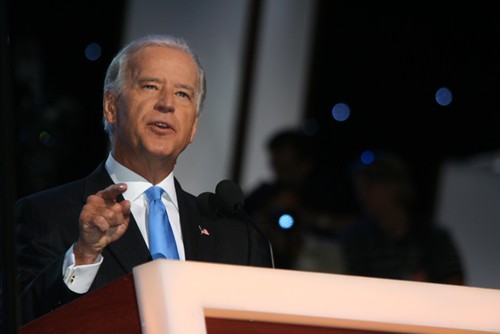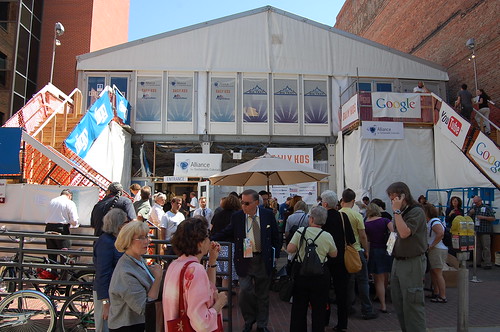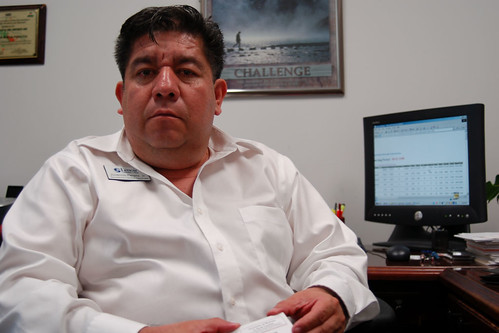By Peter McDermott of the Irish Echo, reporting from Denver:
Joe Biden is a popular choice with the Democratic faithful, judging by brief conversations I’ve had with political figures, delegates, and party supporters over the last 48 hours. A long-time Hillary supporter, New York Congresswoman Nydia Valezquez, told a small group of us ethnic journalists from New York, when we spotted her on Sunday night, that the Delaware senator owned just one car, which he drove himself to the only house that he owned.

Photo via Flickr
Party activist Nancy Touchette of Maryland, whom I met on Monday said that Biden is, “right for this year.”
He’s also a popular choice with the hard-nosed commentariat. On Aug. 22, before the official announcement, the New York Times’ in-house conservative columnist David Brooks (who has said some quite nice things about the presumptive Democratic nominee) said, “Barack Obama has decided upon a vice-presidential running mate. And while I don’t know who it is as I write, for the good of the country, I hope he picked Joe Biden.”
Most Democrats believe Obama has all the qualities needed in a president. But Dan Balz in the Washington Post said he has, “to show he’s willing to embrace some old-fashioned ideas about what it takes to win.” His choosing Joe Biden was one important sign of his pragmatism. And there may have to be others.
Interestingly What it Takes is the title of Richard Cramer’s 1992 book about the 1988 presidential campaign. He followed, from the very beginning, six of the candidates positioning themselves to be Ronald Reagan’s successor in the White House. They were: George Bush Sr. and Bob Dole on the Republican side, and Democrats Michael Dukakis, Dick Gephardt, Gary Hart and Joe Biden.
Cramer used various techniques of the new journalism genre, then still very much in vogue. But his trademark was writing in the third person, channeling the voices of his interviewees, whether the candidate himself, his managers and aides, or his close family members.
He had access, without which the project would not have been possible, and all of the profiles were to varying degrees sympathetic. But he had his favorites (for the most part here I’m relying on my memory, having read it more than 10 years ago).
From early on in their post-World War II marriage, Cramer revealed, Bush and his wife Barbara had sent out thank-you notes to people they’d met, and over the years had compiled an impressive database of names. This courtesy practiced on such a huge scale appeared coldly calculating in political terms.
Hart, for his part, was regarded as a little strange by reporters, and simply in the retelling it seemed he was to Cramer, too. (Yesterday I met Raymond Dean Jones, an African-American columnist here in Denver, which is Hart’s home patch, who said that the former senator suffered from his typically western persona. “He’s a loner,” said Jones, who knows and admires him.) Dukakis came across as a control freak, and Dick Gerphardt was decent and wholesome, as well as stoical in the face of life’s challenges, all of which somehow made him rather bland.
But it was Dole and Biden who emerged as the most human and also the most likeable of the six. The author’s connection to the pair continued after the book was published. Cramer, a liberal, wrote a glowing magazine portrait of Dole (for Rolling Stone, I think) when he was the Republican candidate in 1996. And he encouraged Biden to write his own memoir, “Promises to Keep.”
I haven’t seen What it Takes mentioned in the media so far, but Cramer’s book is bound to be a resource on Biden. When flipping through it before our group’s early-morning Sunday flight from New York to Denver, I came across a snippet that said something about a recent Biden gaffe. A great deal of attention has been paid to his statement during the early primary campaign that Obama was “articulate” and “clean,” among other laudable things. You’re veering into eggshell territory when you say that someone from a traditionally oppressed group knows how to speak. However, Biden used the latter term about himself when he first ran for the Senate as a 29-year-old upstart in 1972 (if I’ve divined Cramer’s narrative technique correctly). And by “clean,” it’s obvious enough to me that he means “clean-cut,” and thus potentially respectable, which is what Biden was when compared to many of his peers 36 years ago.
Peter McDermott is Associate Editor of the Irish Echo in New York. He is covering the Democratic National Convention in Denver, Colorado as part of a project sponsored by the New York Community Media Alliance and Feet in Two Worlds.




